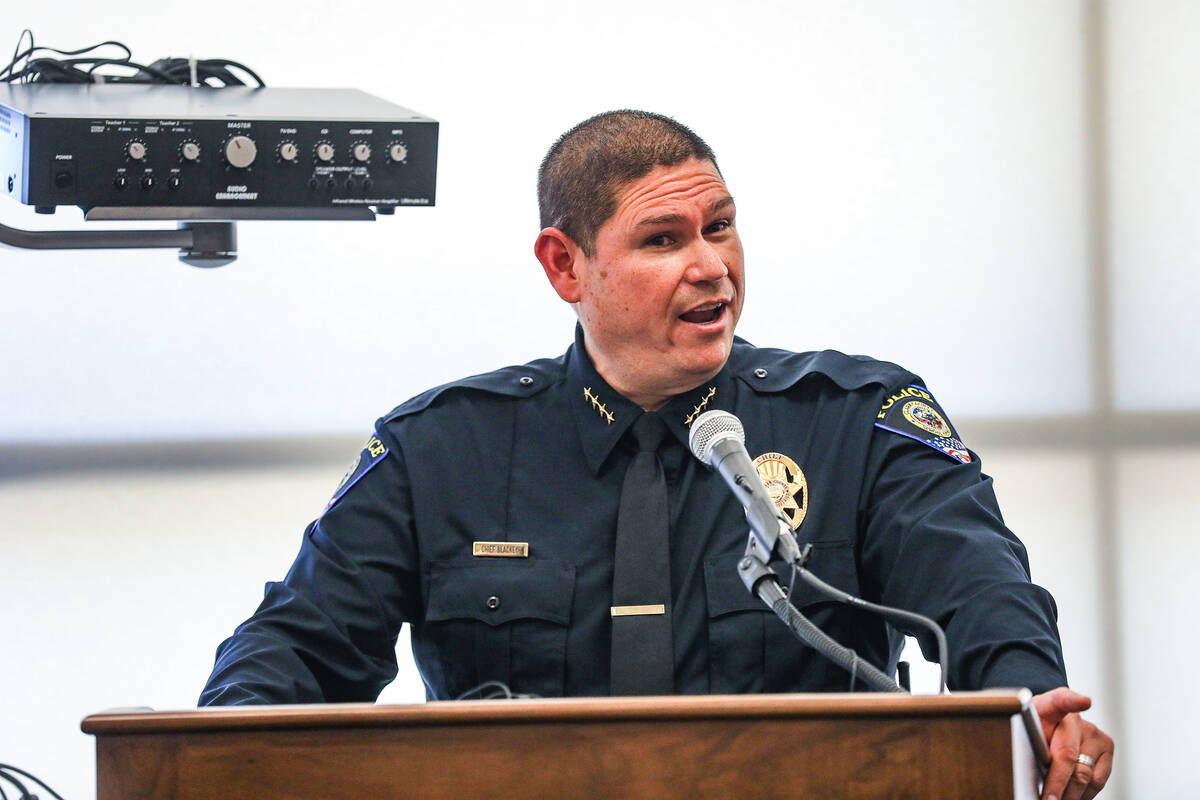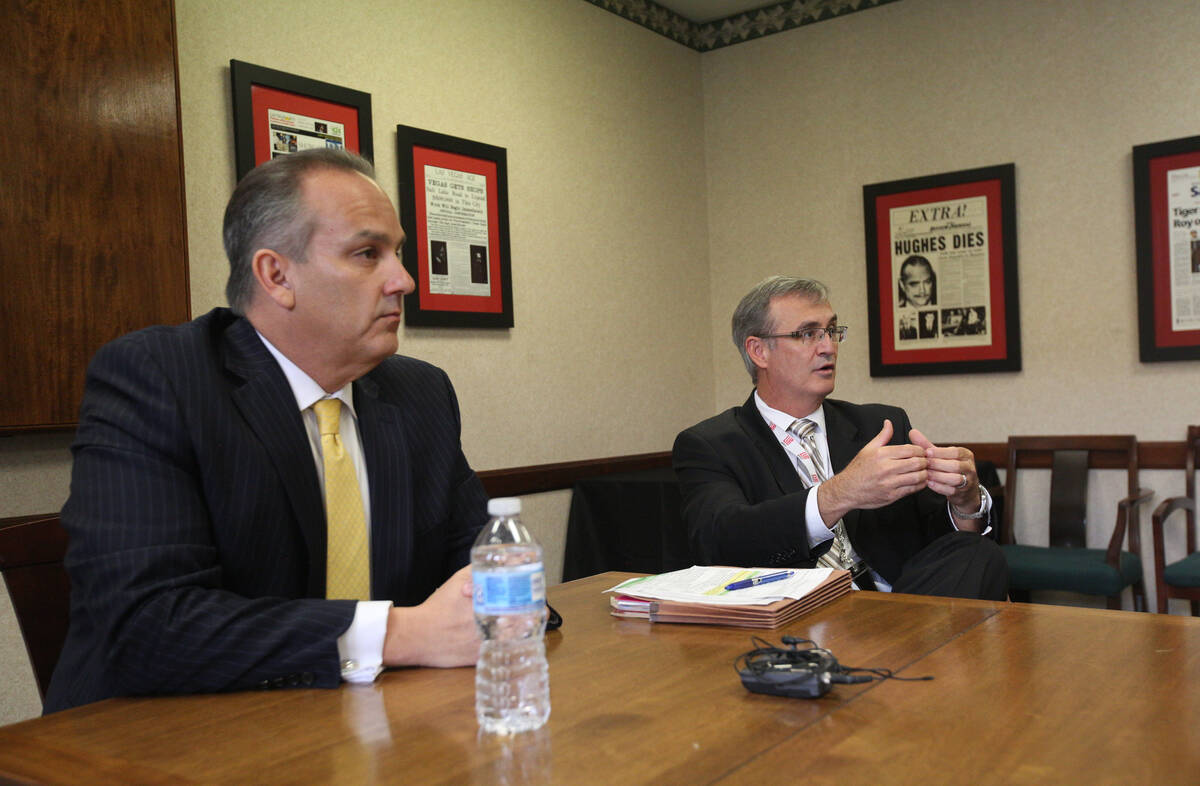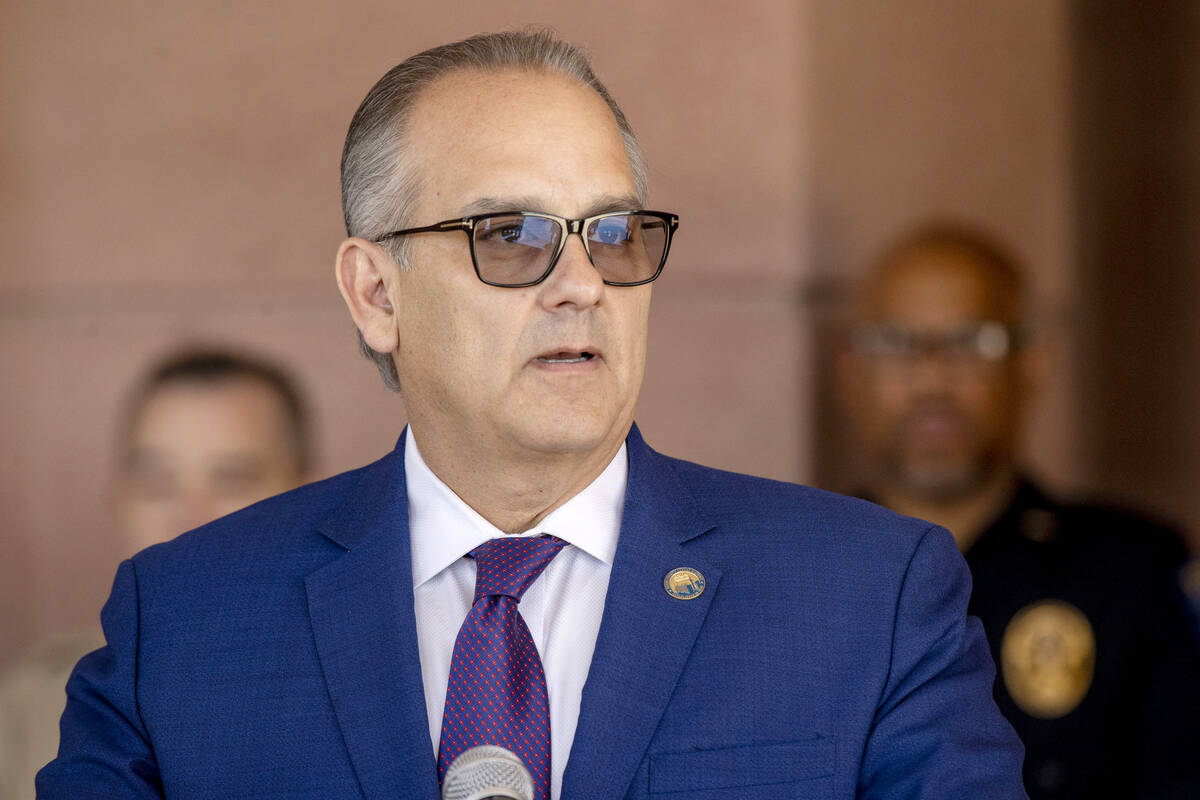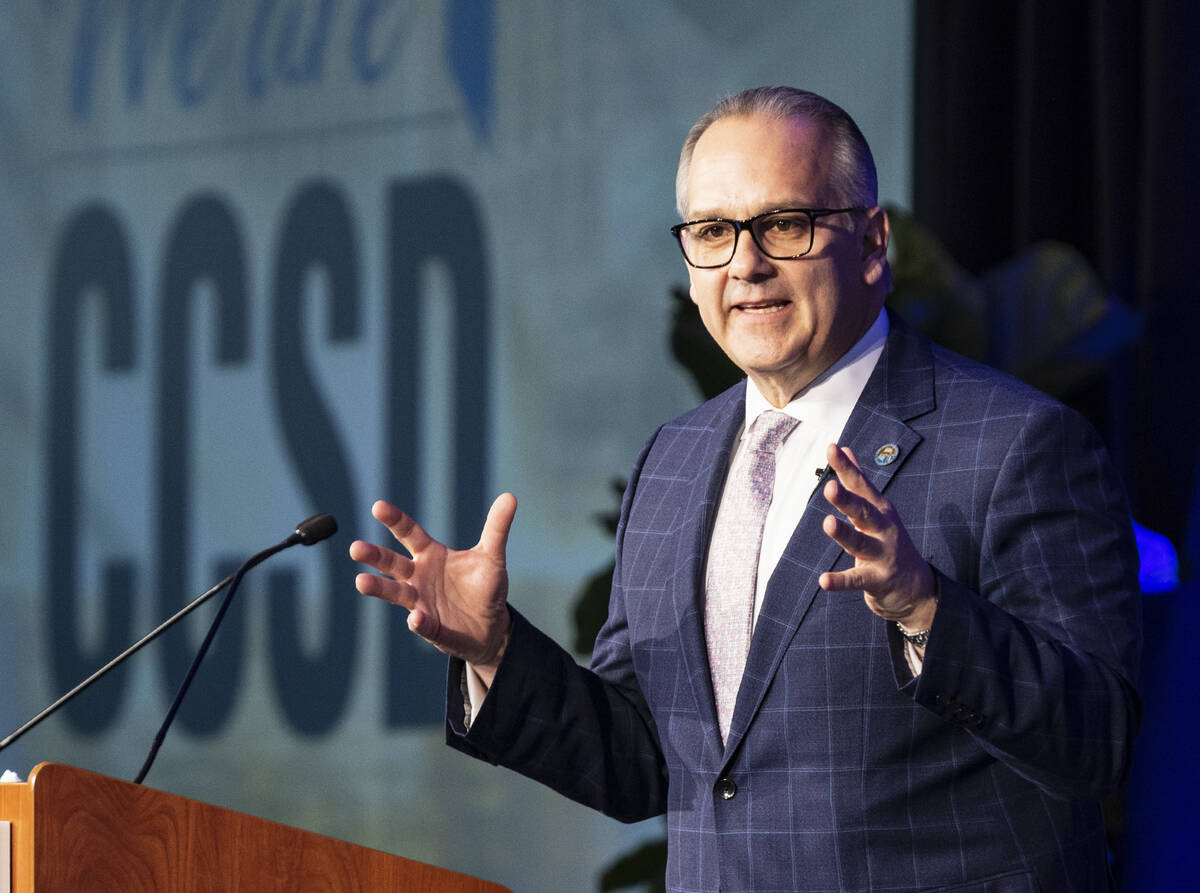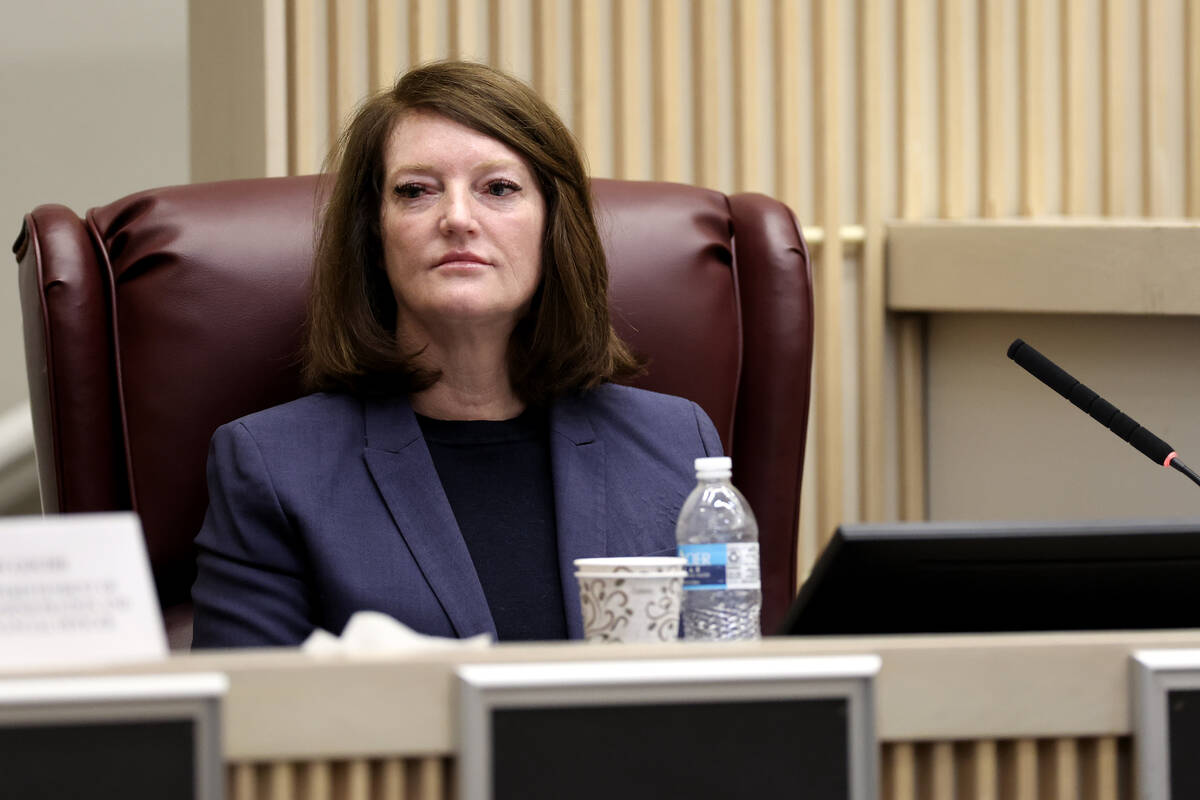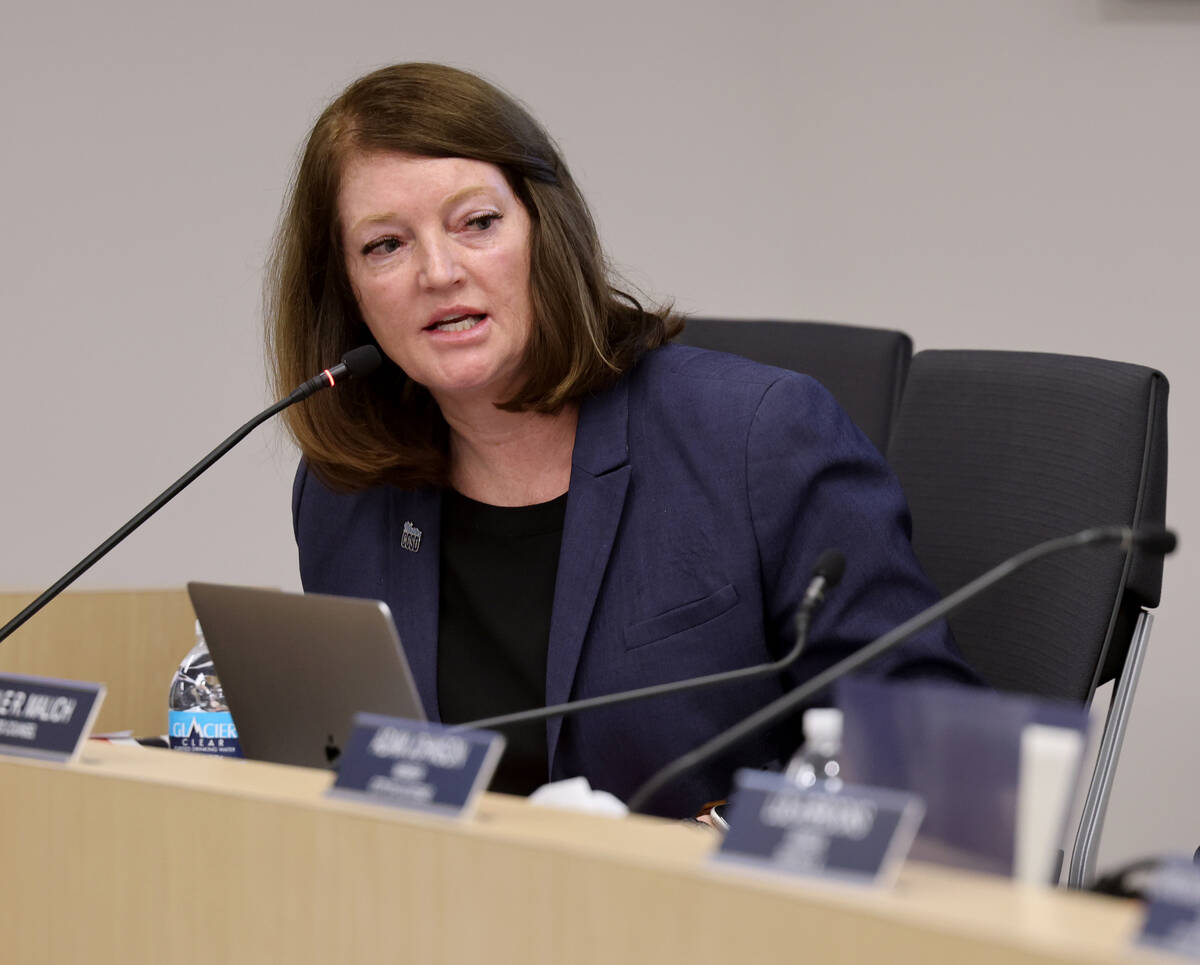Jara’s parting gesture: Raises for his cabinet
Before leaving the Clark County School District this year, then-Superintendent Jesus Jara gave members of his executive cabinet significant raises, including a pay hike of 40 percent to the chief of police.
The $68,000-a-year raise for district police Chief Henry Blackeye made his base pay as high or higher than the pay for the heads of Southern Nevada’s largest municipal police departments, which have more personnel.
Jara also increased the pay of Deputy Superintendent Brenda Larsen-Mitchell by 28 percent, or nearly $60,000, and that of Chief Financial Officer Jason Goudie by 24 percent, or more than $51,000.
The head of the local teachers union, who has been at odds with Jara, criticized the raises after the Las Vegas Review-Journal informed him of them.
“I don’t know how that’s justified when across the board, the balance of the 40,000 employees who work for the school district don’t even come close to getting that,” said John Vellardita, executive director of the Clark County Education Association. “I think the trustees owe it to the public to provide an explanation.”
The administration put educators through “months of hell,” Vellardita said, during contention contract negotiations last year when they saw a slight decrease in their paychecks to fund the increased costs of their pension system.
The district offered a 9 percent salary increase during the first year of a new contract while criticizing the union for sick-outs. In December, an arbitrator approved an agreement that gave teachers a base pay increase of 10 percent the first year and 8 percent the second.
Then in January, the departing superintendent handed out raises costing taxpayers more than $323,000 a year to 13 cabinet members whom he can hire and fire at will. Except for the three double-digit raises, the increases were 8 percent, records show, an amount commensurate with what union-covered district administrators had received through contract negotiations.
The cabinet’s raises were not approved by the Clark County School Board and, according to district representatives, didn’t need to be. But two trustees questioned the unilateral approach and said the policy that allowed it needs to be examined.
“I was somewhat shocked and surprised when I saw the (raise) amounts,” Trustee Linda Cavazos said in an interview. “I was rather disheartened that we did not know about them and that we were not notified.”
She said she was speaking as an individual board member and not for the board.
Payday deja vu
In late February, the School Board approved Jara’s resignation along with a $250,000 payout. Earlier that month, board President Evelyn Garcia Morales said Jara’s departure was a “mutual decision” and that “the pressure to ask him to leave was significant.”
Jara, who came on as superintendent in 2018, faced criticism over lagging student achievement and his handling of the pandemic and teacher contract negotiations. His last day with the district was Feb. 23. He did not respond to a request for comment for this story.
The raises for most at-will cabinet members were approved in January, went into effect in March and were retroactive to July 1 of 2023, Tod Story, the district’s chief communications officer, wrote in an email to the Review-Journal. The Review-Journal learned of the increases only after filing a series of records requests.
Five additional cabinet members had received raises in September when increases were approved for members of the administrators union, the Clark County Association of School Administrators and Professional-Technical Employees. Those administrators did not receive an additional raise this year.
The move by Jara was a familiar one. In fall 2021, a divided board voted to terminate Jara’s contract but then reversed course the following month. In the interim, Jara informed trustees that he planned to award more than $400,000 in base salary increases to members of his cabinet. He said at the time that he was allowed to do so under a policy approved earlier that year by the board.
However this time, Cavazos and Trustee Lisa Guzman said they did not have details of the raises until after they were implemented.
The other elected board members did not respond to requests for comment.
Jara had disclosed that he would be increasing the responsibilities and pay of cabinet members, Guzman said.
“Did I know how much? I surely did not,” she said. “I was just informed that their salaries were going to be competitive with those outside of education.”
‘Comparable’ pay
Jara increased the annual salary of Deputy Superintendent Larsen-Mitchell to $275,000.
Larsen-Mitchell, who has been with the district since 1994, is serving as the interim superintendent as the district launches a search for its next leader.
“The salary for the deputy superintendent was increased based on the length of service and experience and is comparable to other large urban school districts,” Story said.
Larsen-Mitchell did not respond to a request for comment.
Goudie, the district’s chief financial officer, saw his salary increase to $265,000. He has been in the position since 2017.
“The CFO position, already responsible for business and finance, was expanded to include construction, facilities management, strategic planning, technology, and operations, so the salary grew commensurate with the added responsibilities,” Story said.
Goudie did not respond to a request for comment.
Police Chief Blackeye’s base pay increased to $235,000. He oversees 180 people, Story said.
In a February email to Jara, Goudie said that the top pay for police captains had risen to $215,000, and that he believed a $235,000 figure Blackeye had requested therefore was in line. Jara responded that he agreed, records show.
Blackeye did not respond to a request for comment.
Total compensation figures, which include benefits, were not immediately available.
Blackeye now earns more than Henderson’s police chief, whose base pay is $220,000. The Henderson Police Department has more than 700 employees, according to city spokesperson Gina Waters.
The Clark County sheriff, an elected office that leads the Las Vegas Metropolitan Police Department, has a base pay of $176,685, confirmed county spokesperson Stacey Welling. The department has 6,097 employees, said police spokesman officer Robert Wicks.
Nevada’s elected officials are allowed to take their state pensions on top of their government salaries. Sheriff Kevin McMahill also receives $215,000 a year in pension, according to the Public Employees’ Retirement System.
Blackeye’s pay is similar to that of some other police chiefs in Southern Nevada. The head of University Police Services, Southern Command — a department with 133 positions and 72 contract security guards — is paid $233,000 a year, UNLV spokesperson Francis McCabe said. The chief of the North Las Vegas Police Department, which has 420 personnel, also is paid $233,000, according to spokesperson Kathleen Richards.
An incident involving school police has drawn controversy in the past year. Video shows an officer throwing a student to the ground by Durango High School following a report of a firearm near the school. The Review-Journal last year as part of its “What Are They Hiding?” initiative reported how the district had declined to produce a copy of the incident report, body camera footage, and any prior complaints against the officer.
A call for more transparency
In explaining this year’s cabinet raises, Story cited the same regulation Jara referenced in 2021, which suggests the contracts of at-will employees are the purview of the superintendent.
Garcia Morales, the board’s president, speaks for the board, according to a district policy, but did not respond to requests for comment.
Trustee Guzman said trustees had given the superintendent greater latitude in 2021 because of the district’s difficulty in hiring upper-level administrators during the pandemic.
“People were not going back to work,” she said. “It was a tough time to get employees.”
Jara had asserted that giving him that latitude would make the district more competitive, she said.
“Looking back at that time, we felt it was needed. Should we look at it again? Probably,” said Guzman, who emphasized that she did not speak for the board.
In early April, Larsen-Mitchell gave trustees details of the raises in one-on-one sessions, Guzman and Cavazos said.
Guzman said trustees are asking the administration for greater transparency on cabinet raises.
“I think there will be more transparency with what percentage people are given in the future,” she said.
Cavazos said she would have liked to have had specific information on the raises in advance and to have given input.
“I think we need to take a good, hard look at our policies, and I think we need to take a really deep dive into how our governance model is operating right now,” she said.
Contact Mary Hynes at mhynes@reviewjournal.com. Follow @MaryHynes1 on X. Hynes is a member of the Review-Journal’s investigative team, focusing on reporting that holds leaders and agencies accountable and exposes wrongdoing.



